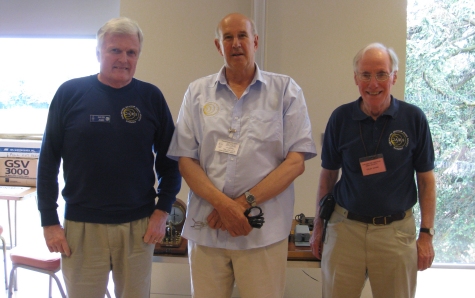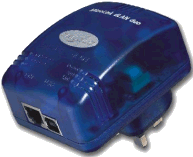Amateur Radio Interview Transcript
1920, Chelmsford, Essex. The birth of radio. Ninety years later, we caught up with the Chelmsford Amateur Radio Society to find out more. Here's the transcript of our interview about Marconi, DAB, Powerline Adapters, and life as a radio ham.
|
Early days of radio:
In Show 53, we played a short extract of our interview with John Bowen, the Chairman of the Chelmsford Amateur Radio Society. Here's a short transcript:
Carl:
So last month was something of a radio milestone, wasn't it, Pete?
Pete:
Yes, it was.
Carl:
And you've been out and about?
Pete:
Indeed, I was down in Chelmsford in Essex, the birthplace of radio, where I caught up with the Chairman of the Chelmsford Amateur Radio Society.

John G1ZUD (Radio operator), John G8DET (Chairman) and Colin G0TRM (Morse)
John G8DET:
Today we've been offered the Education Room in the new £5 million extension to celebrate the fact that 90 years ago, on 15th June, Dame Nellie Melba came to Chelmsford and created basically the first professional broadcast in the world.
Pete:
Before that, there were a number of tests made in Chelmsford.
John G8DET:
The Postmaster General allocated them the call sign MZX, and so in the early days they simply read out the timetable for the railway between London and Chelmsford.
Pete:
Hardly very interesting stuff, which is why Dame Melba was hired in June 1920.
John G8DET:
Now this was the first radio broadcast that Dame Melba had actually done. It was also nearly the last, because she realised that, if she was transmitting, and thousands of people were listening to her for free, they may not come to her operas and pay money to actually hear her.
Carl:
Well, that sounds oddly familiar, doesn't it? - a little bit like musicians and the Internet.
Pete:
Yeah, it sounds a little bit similar to today's musical superstars, and what they're worried about with file sharing, and what that's doing to CD sales.
Carl:
Yes, indeed. Well, the full interview is about 20 minutes long, and of course we can't play all of that now, can we? So we'll be making it available in its entirety on the site.
Pete:
Indeed, and it's well worth a listen. While we were in Chelmsford, we also had a listen in to some of the radio operators talking to the world on short wave.
Radio Operator (John):
From Golf Bravo Nine Zero, Mike Zulu X-Ray, back to Foxtrot Eight Delta Zulu Uniform ...
Pete:
John told us that the world of amateur radio is still very much alive and kicking, and some radio hams have been able to make contact with the International Space Station and even the moon.
John G8DET:
Now that receiver capability has improved, it is now within nearly anybody's capability to receive a signal that has been bounced from the moon.
Pete:
Maybe that could be the subject of one of our next Focuses.
 As John's a radio amateur, we also took the opportunity to get chatting to him about power line adaptors, those things that plug into the mains supply, causing interference that's killing short wave, and as you can expect, the interference that's being generated by these home networking products is causing his colleagues some problems.
As John's a radio amateur, we also took the opportunity to get chatting to him about power line adaptors, those things that plug into the mains supply, causing interference that's killing short wave, and as you can expect, the interference that's being generated by these home networking products is causing his colleagues some problems.
John G8DET:
It can be a complete, total wipeout of the short wave bands, and that can actually go up and even affect your DAB reception. Some people I know have completely given up the short wave bands.
Pete:
John was also very vocal about the subject of DAB - Digital Audio Broadcasting.
John G8DET:
 When DABs was first of all mooted, and it was sold that the quality would be that far superior to that from a CD, I thought, this is great, but unfortunately so many channels have been allocated to such a limited frequency response, that the quality has gone down and down and down, and now it is vastly inferior to that of the ordinary frequency modulated band two receivers.
When DABs was first of all mooted, and it was sold that the quality would be that far superior to that from a CD, I thought, this is great, but unfortunately so many channels have been allocated to such a limited frequency response, that the quality has gone down and down and down, and now it is vastly inferior to that of the ordinary frequency modulated band two receivers.
Pete:
And also, being a radio enthusiast, John wasn't that impressed with the government's plans to switch off FM radio as early as 2015.
John G8DET:
I think it's a dreadful thing. I think that commercially they haven't thought the whole thing through, and it's been from lobbying of the radio industry, with maybe the thought they can sell more equipment, but I just don't think people are going to buy it.
Carl:
Right, and that's available on the site now, isn't it? - because I might go and have a quick listen right away, if you don't mind?
Pete:
Absolutely - just select Show List from the site, and pick Show 53. We'd like to send our thanks to John Bowen, G8DET, and his colleagues, at the Chelmsford Amateur Radio Society, for their hospitality.
|
Handy links: